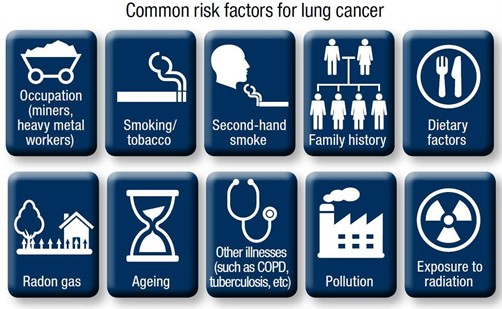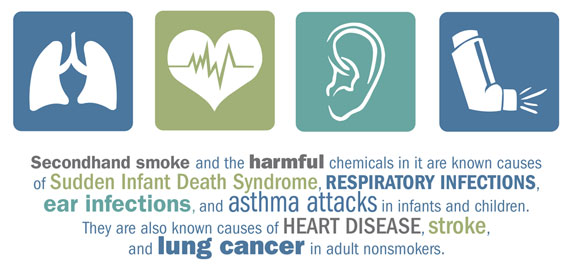What Are the Risk Factors for Lung Cancer?
Research has found several risk factors that may increase your chances of getting lung cancer.
Secondhand smoke and the harmful chemicals in it are known causes of sudden infant death syndrome, respiratory infections, ear infections, and asthma attacks in infants and children. They are also known causes of heart disease, stroke, and lung cancer in adult nonsmokers.
Smoke from other people’s cigarettes, pipes, or cigars also causes lung cancer. When a person breathes in secondhand smoke, it is like he or she is smoking.
Radon is a cancer causing, naturally occurring gas that comes from rocks and dirt and can get trapped in houses and buildings. It cannot be seen, tasted, or smelled. According to the U.S. Environmental Protection Agency (EPA) radon causes about 20,000 cases of lung cancer each year, making it the second leading cause of lung cancer. Nearly one out of every 15 homes in the United States are thought to have high radon levels. The EPA recommends testing homes for radon and using proven ways to lower high radon levels. The only way to determine if your home is trapping radon gas is to test.
Test kits can also be purchased from a certified lab or from the National Radon Program. If you purchase a kit from a home improvement store, be sure to check the expiration date. Another option is to hire a radon measurement provider that is certified by one of the two national certification programs, the American Association of Radon Scientists and Technologists, Inc. (AARST) National Radon Proficiency Program or the National Radon Safety Board. The South Carolina Radon Program offers free short-term radon test kits to South Carolina homeowners, subject to availability.
Examples of substances found at some workplaces that increase risk include asbestos, arsenic, diesel exhaust, and some forms of silica and chromium. For many of these substances, the risk of getting lung cancer is even higher for those who smoke.
If you are a lung cancer survivor, there is a risk that you may develop another lung cancer, especially if you smoke. Your risk of lung cancer may be higher if your parents, brothers or sisters, or children have had lung cancer. This could be true because they also smoke, or they live or work in the same place where they are exposed to radon and other substances that can cause lung cancer.
Cancer survivors who had radiation therapy to the chest are at higher risk of lung cancer.
Scientists are studying many different foods and dietary supplements to see whether they change the risk of getting lung cancer. There is much we still need to know. We do know that people who smoke and take beta-carotene supplements have increased risk of lung cancer. For more information, visit Lung Cancer Prevention.
Also, arsenic and radon in drinking water (primarily from private wells) can increase the risk of lung cancer.
What Can I Do to Reduce My Risk of Lung Cancer?
You can help lower your risk of lung cancer in the following ways:
- Don’t smoke. Cigarette smoking causes about 80% to 90% of lung cancer deaths in the United States. The most important thing you can do to prevent lung cancer is to not start smoking, or to quit if you smoke.
- Avoid secondhand smoke. Smoke from other people’s cigarettes, cigars, or pipes is called secondhand smoke. Make your home and car smoke-free.
- Get your home tested for radon. The U.S. Environmental Protection Agency recommends that all homes be tested for radon.
- Be careful at work. Health and safety guidelines in the workplace can help workers avoid carcinogens—things that can cause cancer.
For more information about lung cancer visit the Centers for Disease Control.
To help fight lung cancer in South Carolina visit the South Carolina Cancer Alliance or call (803) 708-4732.

